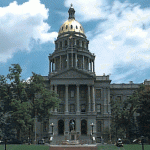Well, it’s that time of year again….
Hey, stop giving me those blank stares!
Time to preview Colorado’s upcoming legislative session and the debates over bills and policies that could affect K-12 education in our state. Session starts in two days, and Ed News Colorado has posted the annual preview by Todd Engdahl — a must-read for local education transformers.
Of course, anyone who has been paying attention or reading what I have to say, knows what the driving theme will be. Engdahl’s story hammers it home:
“The budget is the big elephant in the room,” said Vincent Badolato, public affairs vice president for the Colorado League of Charter Schools.
He and many others identify budget cuts as the overarching education issue of 2011 – as they were in 2009 and 2010. “It’s budget, budget, budget,” said Moira Cullen of the lobbying firm Capstone Group.
State K-12 support and higher education funding consume 55 percent of the state’s $7 billion general fund. Continued budget belt-tightening for education is a given because state revenues remain fragile and because the legislature must approve a balanced budget, can’t increase taxes without voter approval and also faces spending demands for Medicaid and other human services programs.
In some ways, it’s not a whole lot different than the prospects facing the opening of last year’s session. But this time around there is no Race to the Top, no big reform bill push, a divided legislature, and a governor without a focus on significant changes to education. Twenty-eleven also isn’t an election year (we’re not counting school boards here).
Still, Ed News Colorado reports on a couple intriguing ideas:
Sen. Nancy Spence, R-Centennial, has an administrative idea that likely will make districts nervous. She said in December that she’s planning legislation that would require school districts to seek requests for proposals from private companies for outsourcing non-instructional services such as transportation, janitorial, food service and similar functions. Districts then would be required to hold public meetings to inform citizens about the comparative costs of outsourcing a service as opposed to providing it with district employees….
Freshman Rep. Don Beezley, R-Broomfield, said, “You’ll find me pretty focused on charter schools and parent empowerment. I’m looking at a couple of charter-related bills.” Specifics remain to be fleshed out; “We’re working on it.”
Beezley said he’s interested in the “parent trigger” idea, referring to a California law that allows organized parents to take over a failing school and have it turned in to a charter, its teachers and principals replaced.
And we can always hope for a surprise or two that includes broader support for bold, outside-the-box thinking — like the creation of a cost-saving tuition tax credit program that expands private school choice. That’s what my Education Policy Center friends have researched and proposed in the K-12 education chapter of the new Citizens’ Budget.
Some lawmakers and interest groups may insist on a quiet session. But no matter what, I’ll still be out here making noise for some meaningful K-12 policy changes that provide choice and accountability, changes that empower families. I hope more of my education transformer friends will join me.







